【暑假打卡计划】2025年九年级英语上册预习篇 第14天Unit 3(人教版)(含答案详解)
文档属性
| 名称 | 【暑假打卡计划】2025年九年级英语上册预习篇 第14天Unit 3(人教版)(含答案详解) |
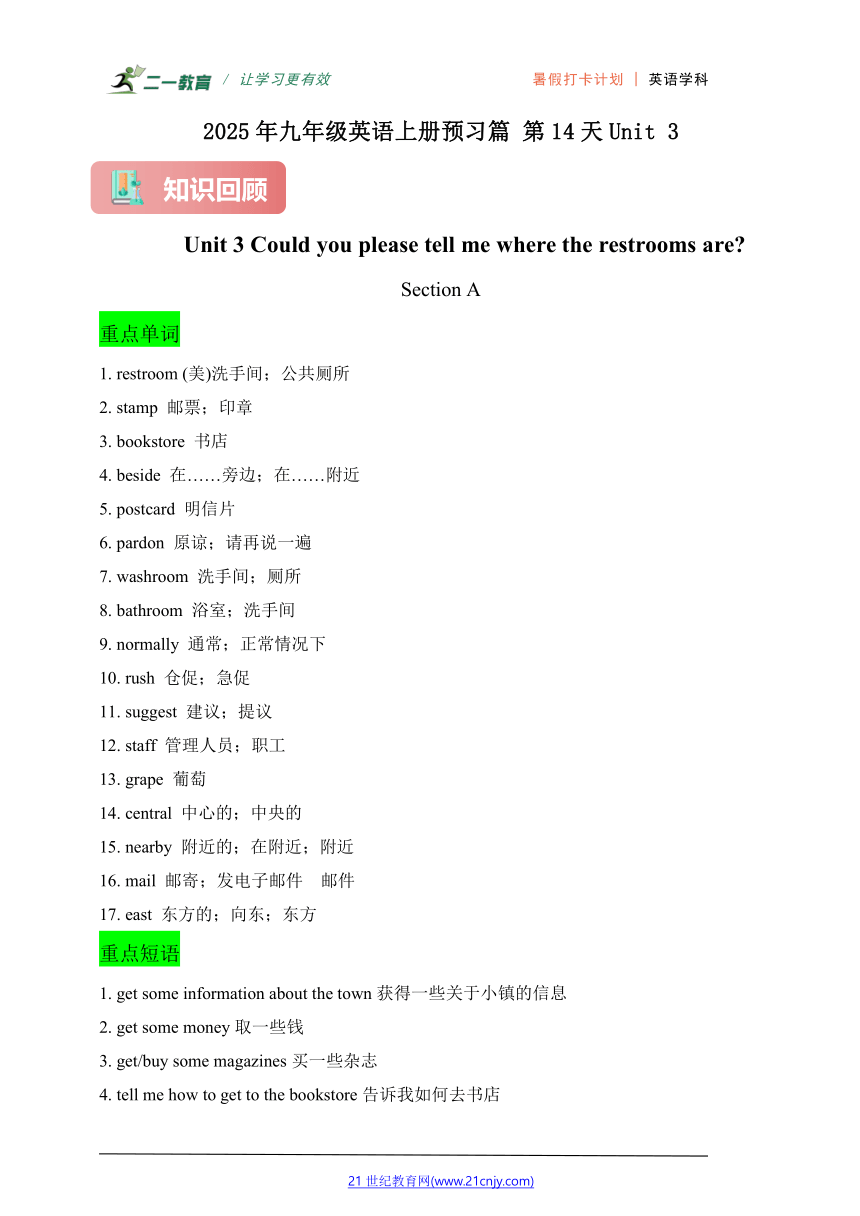
|
|
| 格式 | docx | ||
| 文件大小 | 343.7KB | ||
| 资源类型 | 试卷 | ||
| 版本资源 | 人教新目标(Go for it)版 | ||
| 科目 | 英语 | ||
| 更新时间 | 2025-06-25 00:00:00 | ||
图片预览

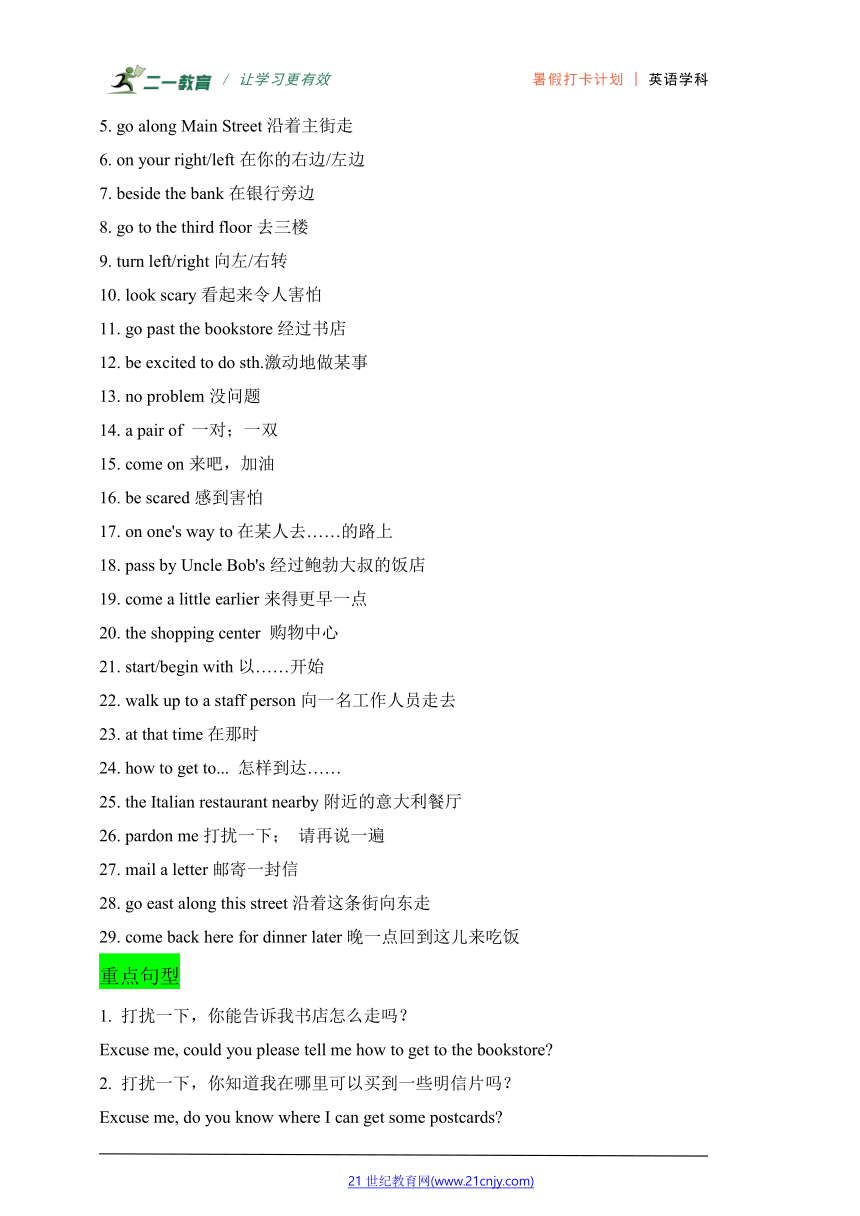
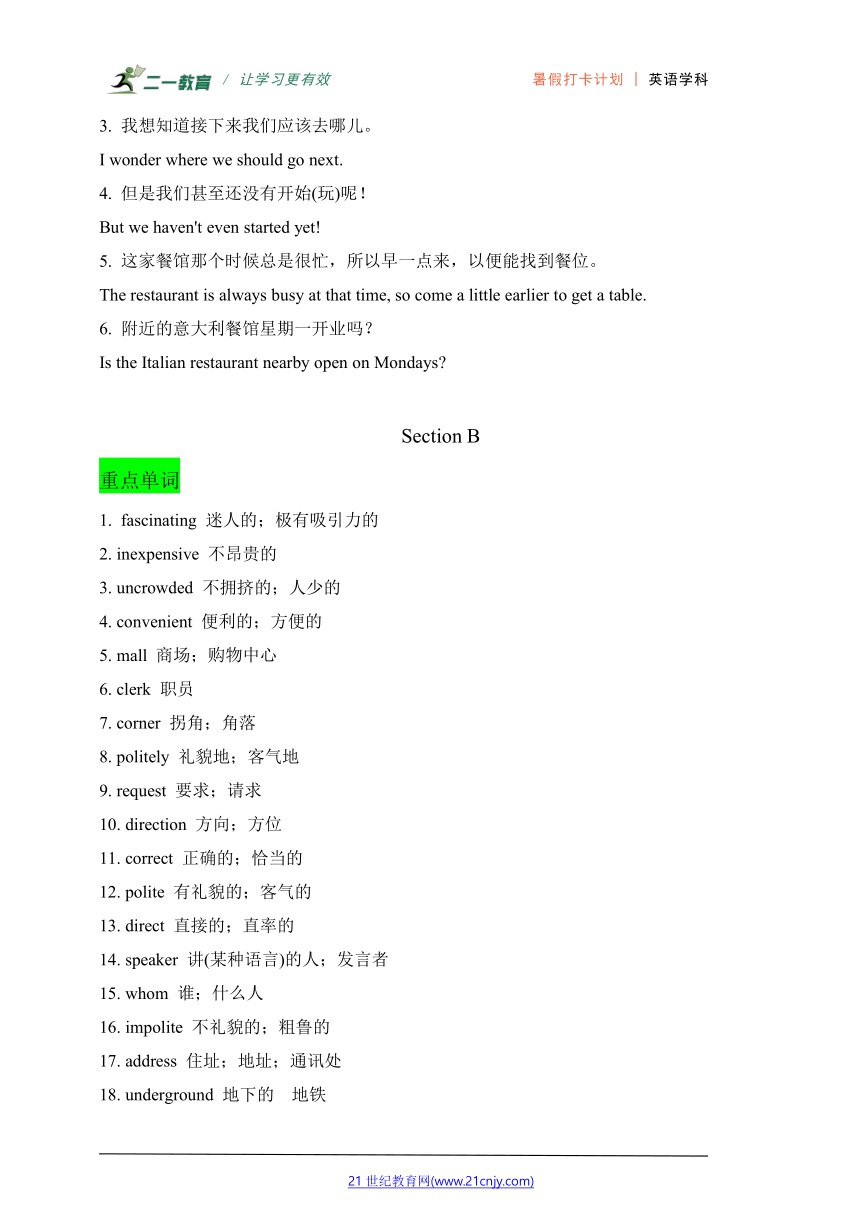
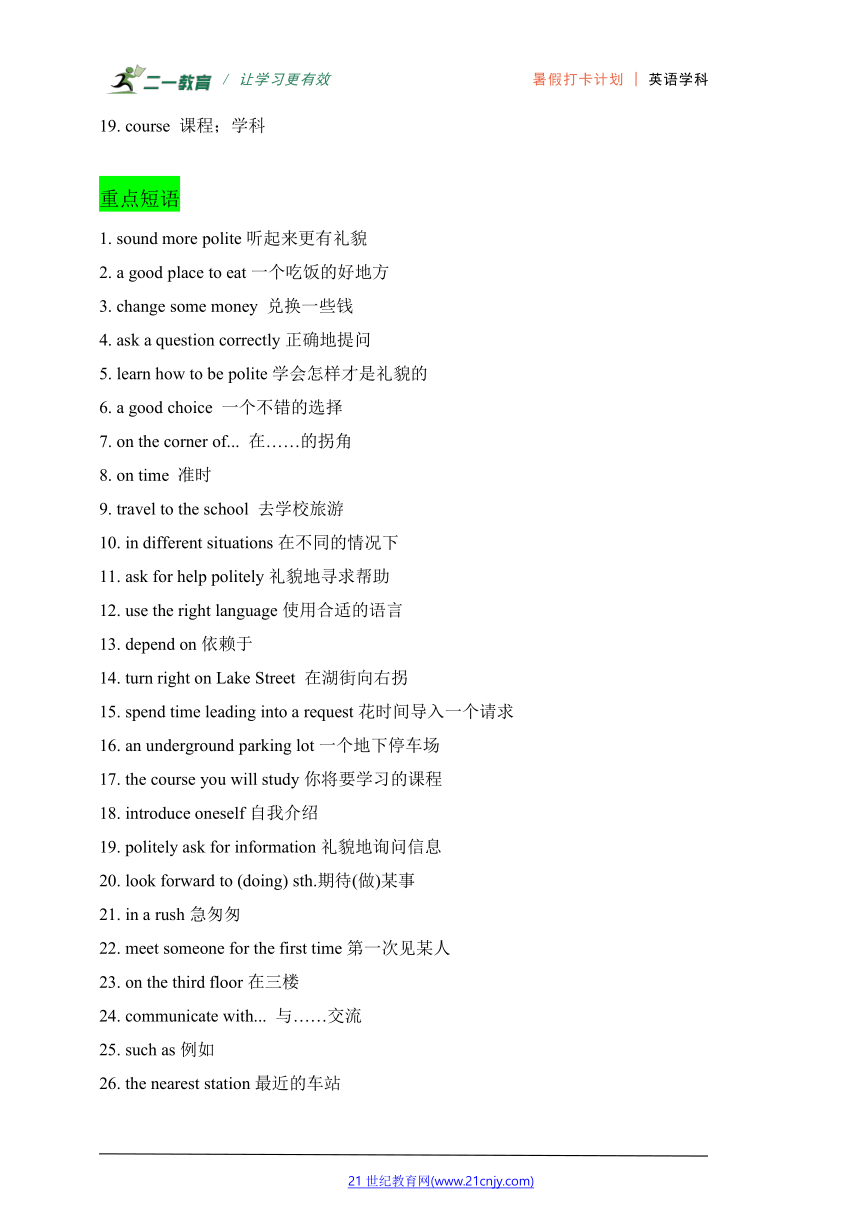
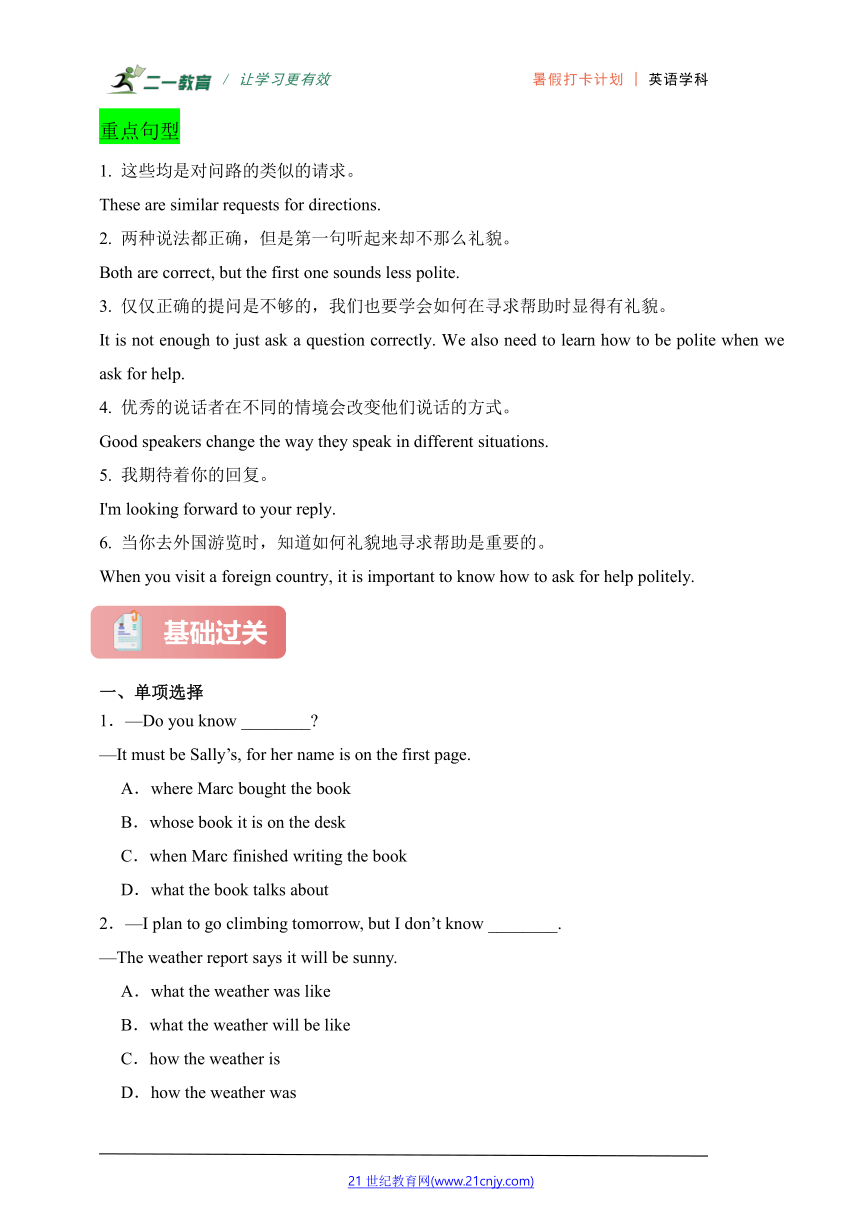
文档简介
/ 让学习更有效 暑假打卡计划 | 英语学科
2025年九年级英语上册预习篇 第14天Unit 3
Unit 3 Could you please tell me where the restrooms are
Section A
重点单词
1. restroom (美)洗手间;公共厕所
2. stamp 邮票;印章
3. bookstore 书店
4. beside 在……旁边;在……附近
5. postcard 明信片
6. pardon 原谅;请再说一遍
7. washroom 洗手间;厕所
8. bathroom 浴室;洗手间
9. normally 通常;正常情况下
10. rush 仓促;急促
11. suggest 建议;提议
12. staff 管理人员;职工
13. grape 葡萄
14. central 中心的;中央的
15. nearby 附近的;在附近;附近
16. mail 邮寄;发电子邮件 邮件
17. east 东方的;向东;东方
重点短语
1. get some information about the town获得一些关于小镇的信息
2. get some money取一些钱
3. get/buy some magazines买一些杂志
4. tell me how to get to the bookstore告诉我如何去书店
5. go along Main Street沿着主街走
6. on your right/left在你的右边/左边
7. beside the bank在银行旁边
8. go to the third floor去三楼
9. turn left/right向左/右转
10. look scary看起来令人害怕
11. go past the bookstore经过书店
12. be excited to do sth.激动地做某事
13. no problem没问题
14. a pair of 一对;一双
e on来吧,加油
16. be scared感到害怕
17. on one's way to在某人去……的路上
18. pass by Uncle Bob's经过鲍勃大叔的饭店
e a little earlier来得更早一点
20. the shopping center 购物中心
21. start/begin with以……开始
22. walk up to a staff person向一名工作人员走去
23. at that time在那时
24. how to get to... 怎样到达……
25. the Italian restaurant nearby附近的意大利餐厅
26. pardon me打扰一下; 请再说一遍
27. mail a letter邮寄一封信
28. go east along this street沿着这条街向东走
e back here for dinner later晚一点回到这儿来吃饭
重点句型
1. 打扰一下,你能告诉我书店怎么走吗?
Excuse me, could you please tell me how to get to the bookstore
2. 打扰一下,你知道我在哪里可以买到一些明信片吗?
Excuse me, do you know where I can get some postcards
3. 我想知道接下来我们应该去哪儿。
I wonder where we should go next.
4. 但是我们甚至还没有开始(玩)呢!
But we haven't even started yet!
5. 这家餐馆那个时候总是很忙,所以早一点来,以便能找到餐位。
The restaurant is always busy at that time, so come a little earlier to get a table.
6. 附近的意大利餐馆星期一开业吗?
Is the Italian restaurant nearby open on Mondays
Section B
重点单词
fascinating 迷人的;极有吸引力的
2. inexpensive 不昂贵的
3. uncrowded 不拥挤的;人少的
4. convenient 便利的;方便的
5. mall 商场;购物中心
6. clerk 职员
7. corner 拐角;角落
8. politely 礼貌地;客气地
9. request 要求;请求
10. direction 方向;方位
11. correct 正确的;恰当的
12. polite 有礼貌的;客气的
13. direct 直接的;直率的
14. speaker 讲(某种语言)的人;发言者
15. whom 谁;什么人
16. impolite 不礼貌的;粗鲁的
17. address 住址;地址;通讯处
18. underground 地下的 地铁
19. course 课程;学科
重点短语
1. sound more polite听起来更有礼貌
2. a good place to eat一个吃饭的好地方
3. change some money 兑换一些钱
4. ask a question correctly正确地提问
5. learn how to be polite学会怎样才是礼貌的
6. a good choice 一个不错的选择
7. on the corner of... 在……的拐角
8. on time 准时
9. travel to the school 去学校旅游
10. in different situations在不同的情况下
11. ask for help politely礼貌地寻求帮助
12. use the right language使用合适的语言
13. depend on依赖于
14. turn right on Lake Street 在湖街向右拐
15. spend time leading into a request花时间导入一个请求
16. an underground parking lot一个地下停车场
17. the course you will study你将要学习的课程
18. introduce oneself自我介绍
19. politely ask for information礼貌地询问信息
20. look forward to (doing) sth.期待(做)某事
21. in a rush急匆匆
22. meet someone for the first time第一次见某人
23. on the third floor在三楼
municate with... 与……交流
25. such as例如
26. the nearest station最近的车站
重点句型
1. 这些均是对问路的类似的请求。
These are similar requests for directions.
2. 两种说法都正确,但是第一句听起来却不那么礼貌。
Both are correct, but the first one sounds less polite.
3. 仅仅正确的提问是不够的,我们也要学会如何在寻求帮助时显得有礼貌。
It is not enough to just ask a question correctly. We also need to learn how to be polite when we ask for help.
4. 优秀的说话者在不同的情境会改变他们说话的方式。
Good speakers change the way they speak in different situations.
5. 我期待着你的回复。
I'm looking forward to your reply.
6. 当你去外国游览时,知道如何礼貌地寻求帮助是重要的。
When you visit a foreign country, it is important to know how to ask for help politely.
一、单项选择
1.—Do you know ________
—It must be Sally’s, for her name is on the first page.
A.where Marc bought the book
B.whose book it is on the desk
C.when Marc finished writing the book
D.what the book talks about
2.—I plan to go climbing tomorrow, but I don’t know ________.
—The weather report says it will be sunny.
A.what the weather was like
B.what the weather will be like
C.how the weather is
D.how the weather was
3.—Can you tell me ________ now I am not sure if it is open.
—Sure. It’s open now.
A.why can I go to the library
B.why I can go to the library
C.whether I can go to the library
D.whether can I go to the library
4.—Have you decided ________ to hold the class meeting
—Yes, it will be held tomorrow morning.
A.where B.how C.when D.why
5.The natural world is quite amazing. I really want to know ________ leaves turn yellow in autumn.
A.why B.when C.which D.what
6.—Can you tell me ________ I can take No. 3 bus to the railway station
—Sorry, I don’t know. I’m a new comer.
A.how B.why C.where D.what
7.He looks worried. I wonder ________ he has already known about the result.
A.where B.whether
C.why D.how
8.—Where is Jim now
—Maybe at school. After he ________, he got up quickly to go to school.
A.cheered up B.put up
C.thought up D.woke up
9.—________ did you invite to your birthday party
—All my friends.
A.Who B.What
C.Where D.Why
10.I wonder ________ next.
A.what to do B.how to do C.how to find D.what can I do
二、单词拼写
11.I want to find a (附近的) restaurant to have lunch at once. Could you please tell me where I can go
12.The boy (建议) that we should improve our spoken English by joining an English club.
13.The twins want to go to the post office to (邮寄) some gifts to their friends.
14.There is a (中心的) square over there and many old people dance there every morning.
15.Enough sunshine makes the (葡萄) in Turpan sweet.
16.The president is expected to take office on July 1, after being appointed by the (中央)government.
17. (想象) what will be like in the future.
18.Your mom will take ________ (骄傲) in what you have achieved.
19.He (很少) visits his grandparents.
20.I think he is very (有礼貌的) and generous.
21.—Is there anything new in today’s news
—Yes. (明信片) for the important event came out for the first time on Oct. 27.
22.There is no (仓促). We don’t have to be at the station until 10 a. m.
23.It’s our traditional culture for the young to speak (礼貌地) to the old.
24.My parents always remind me that we should be (有礼貌的) to the old.
25.Tell me your (地址) so that I can send you the material.
26.Go straight through the door, and you will see our (地下的) parking lot.
27.—Come home before ten, dear.
—OK, Mom. I (承诺).
28.Can you give me a (正确的)answer to this question Don’t give me the wrong answer again.
29.He knew every (角落)of the old town.
30.I’d like to go somewhere (不拥挤) to spend my holiday.
三、语法选择
Calvin needed to go to New York for a meeting this Saturday. It was 31 first time to go to New York, so he didn’t know his way around New York. The meeting was in Peterson Building on 34th Street and it 32 start at ten o’clock. He wanted to get there on time, 33 he asked two American teenage boys for help.
“Excuse me, could you please tell me 34 34th Street is ” asked Calvin politely.
“Sure,” answered one of the boys. “Actually, it’s not far from here. And you can just walk along this street and turn left at 35 first crossing. Then you can see it 36 your right.”
“No. Don’t listen to him. He is not telling you the right place. You can just take the No. 7 bus and get off at the third stop,” said 37 boy.
Then the first boy said, “OK. But the third stop is not 34th Street. It’s 35th Street.”
At this time, Calvin 38 that there were only five minutes left. Then he got into a taxi and left as soon as possible. Calvin thought maybe he should ask a policeman for help next time. After all, children were 39 not very good at directions, while policemen were experts of 40 the way. Luckily, Calvin didn’t arrive late for the meeting.
31.A.he B.him C.his
32.A.should B.would C.must
33.A.though B.because C.so
34.A.where B.how C.what
35.A./ B.a C.the
36.A.of B.on C.in
37.A.another B.other C.the other
38.A.finds B.will find C.found
39.A.normal B.normally C.more normally
40.A.tell B.to tell C.telling
四、完形填空
Liu Rui, a 15-year-old boy from Guangdong, became short-sighted (近视) at the age of five. Most students in Liu’s class wear 41 . In fact, half of Chinese teenagers are short-sighted. But young people aren’t the only ones with poor eyesight in China. This is because people don’t use electronic devices (电子设备) 42 . Many people spend a lot of time 43 books and electronic devices. It makes eyes tired. Also, many people know that reading under dark light is bad for their eyes.
Many people wonder why eating too much sugar is another reason. Scientists 44 that eating too much sugar can do bad to your eyes too. That’s because too much sugar in the body brings a shortage (缺乏) of vitamin B1. It is very bad for your eyes.
How to protect your eyes Many scientists give advice on how to better protect 45 eyes:
Follow 46 20-20-20 rule: Every 20 minutes, take away any electronic devices you are using. Then, watch 20-meter-away trees 47 20 seconds.
A study shows that kids spending more time outside are not easy 48 short-sighted. When you’re outside, your eyes have 49 time to watch greens. At the same time, your eyes can get more sunlight. It can help your eyes grow 50 stay healthy as well.
41.A.glass B.glasses C.a glass
42.A.proper B.properly C.more properly
43.A.read B.reading C.to read
44.A.agree B.are agreeing C.has agreed
45.A.you B.your C.yours
46.A.a B.an C.the
47.A.in B.for C.with
48.A.to become B.become C.becoming
49.A.more B.many C.most
50.A.as B.so C.and
五、选词填空
park make tourists large or fun time enjoy world the in take
Do you like visiting parks Parks are great places to 51 yourselves. The following three parks might be the ones that you are interested in.
Hyde Park is 52 biggest royal park of the UK in the center of London. It was built to be a royal park in 1536. About one hundred years later, the 53 was open to the public. Speakers’ Corner in Hyde Park is famous all over the 54 . Everyone can 55 a speech there on Sunday afternoons.
Central Park is a man-made park 56 the center of Manhattan, New York. It 57 about 15 years to build the park and in 1873 it was open to the public. With 21 playgrounds and 2 zoos, Central Park is a wonderful place for children to have 58 .
Banff National Park, the 59 park in Alberta, Canada, was open in 1885. The park is as large as 6,641 km. Whether by car, boat, bus, bike 60 on foot, you can enjoy the mountains, lakes, the plants and wild animals. There’re three famous ski areas in the park. It attracts thousands of tourists to come every winter.
六、书面表达
61.行为举止是否文明礼貌体现的不仅仅是个人形象和城市形象,也在一定程度上反映了社会的文明程度。为配合我市开展“创建文明城市(build a civilized city)”活动,学校号召同学们做一个文明的中学生,特举办以“How to Behave Well”为题的英文征文比赛。请根据以下要点提示,写一篇90词左右的短文。开头已经给出,不计入总词数。
要点:
1. 在学校我们应该怎么做;
2. 在校外我们应该怎么做;
3. 号召大家为此次活动共同努力。
How to Behave Well
To be a civilized student is very important for a student. Here are what we should do and shouldn’t do.
______________________________________________________________________________________________________________________________________________________________________________________________________________________________________________________________________________________________________________________________________________________________________________________________________________________________________________________________________________________________________________________________________________________________________________________________________________________________________________________________________________________________________________________________
参考答案
一、
1.B
【详解】句意:——你知道桌子上的书是谁的吗?——它一定是Sally的,因为她的名字在第一页上。
考查宾语从句辨析。where Marc bought the book Marc在哪里买的书;whose book it is on the desk桌子上的书是谁的;when Marc finished writing the book Marc什么时候写完书的;what the book talks about这本书谈论的什么。根据回答“It must be Sally’s”可知,此处问书是谁的。故选B。
2.B
【详解】句意:——我计划明天去爬山,但不知道天气怎么样。——天气预报说天气将会晴朗。
考查宾语从句的时态。根据“I plan to go climbing tomorrow”可知,询问的是未来的天气情况,宾语从句用一般将来时,排除A、C、D。故选B。
3.C
【详解】句意:——你可以告诉我,我现在是否可以去图书馆了吗?我不确定它是否开放。——当然可以。它现在正开放。
考查宾语从句。此处是宾语从句,从句用陈述语序,排除A和D选项。根据答语“It’s open now.”可知,想问的是“是否可以去图书馆”,用whether引导宾语从句,故选C。
4.C
【详解】句意:——你决定什么时候开班会了吗?——是的,明天上午举行。
考查连词。where在哪里;how怎样;when当……时;why为什么。根据答句“Yes, it will be held tomorrow morning.”可知,问的是时间。故选C。
5.A
【详解】句意:自然界是很神奇的。我很想知道为什么树叶在秋天变黄。
考查宾语从句引导词。why为什么;when什么时候;which哪一个;what什么。由“I really want to know…leaves turn yellow in autumn”可知,想知道为什么树叶在秋天会变黄。故选A。
6.C
【详解】句意:——你能告诉我在哪里乘3路公共汽车到火车站吗?——抱歉,我不知道。我是新来的。
考查宾语从句。how怎样;why为什么;where在哪里;what什么。根据“Can you tell me …I can take No. 3 bus to the railway station”及“I’m a new comer.”可知,询问在哪里乘3路公共汽车,故选C。
7.B
【详解】句意:他看起来很担心。我想知道是否他已经知道结果了。
考查宾语从句。where哪里;whether是否;why为什么;how如何。动词“wonder”后是宾语从句,根据“he has already known about the result”可知表达“想知道是否他已经知道结果了”用引导词“whether”引导从句。故选B。
8.D
【详解】句意:——吉姆现在在哪里? ——或许在学校。在他醒来之后,他很快起床去学校了。
考查动词词组。cheered up使高兴;put up张贴;thought up想出;woke up醒来。根据“he got up quickly to go to school”可知,此处需要表达他醒来就去学校了。故选D。
9.A
【详解】句意:——你邀请谁来参加你的生日聚会?——我所有的朋友。
考查特殊疑问词。Who谁;What什么;Where哪里;Why为什么。根据答语“All my friends.”可知,询问邀请的人是谁,用疑问词Who。故选A。
10.A
【详解】句意:我不知道下一步该做什么。
考查宾语从句和“疑问词+动词不定式”结构。宾语从句用陈述语序,排除D;BC选项中的how是疑问副词,而do和find是及物动词,后要加宾语,副词不可以作宾语成分,排除BC;A选项符合,what可以作do的宾语。故选A。
二、
11.nearby
【详解】句意:我想马上找一家附近的餐馆吃午饭。你能告诉我该去哪里吗?根据中文提示可知,附近的“nearby”,形容词作定语,故填nearby。
12.suggests/suggested
【详解】句意:这个男孩建议我们应该通过加入一个英语俱乐部来提高我们的口语。根据句子结构,此句是一个宾语从句,空格处缺谓语动词。suggest表示“建议”,动词,此句可以用一般现在时或一般过去时。用一般现在时主语boy是第三人称,动词要用三单形式,故填suggests/suggested。
13.mail/post/send
【详解】句意:这对双胞胎想去邮局给他们的朋友寄一些礼物。根据括号内的汉语意思可知,mail/post/send的意思都是“邮寄”,动词,动词不定式符号to后跟动词原形。故填mail/post/send。
14.central
【详解】句意:那里有一个中心广场,每天早上有很多老人在那里跳舞。central“中心的”,形容词,在句中作定语修饰square。故填central。
15.grapes
【详解】句意:充足的阳光使吐鲁番的葡萄甜。grape“葡萄”,此空应填复数形式表示这一类别,故填grapes。
16.central
【详解】句意:总统由中央政府任命后,预计将于7月1日就职。根据语境此处需要的是形容词作定语,根据所给的汉语提示“中央”可知,应用central。故填central。
17.Imagine
【详解】句意:想象未来会是什么样子。“想象”imagine,本句是主从复合句,主句是祈使句,所以以动词原形开头,句首单词首字母需大写。故填Imagine。
18.pride
【详解】句意:你妈妈会为你的成就感到骄傲的。由句意及语境可推测,本题考查take pride in sb./sth.“为某人/某事感到骄傲”。故填pride。
19.seldom
【详解】句意:他很少拜访他的祖父母。根据“He…visits his grandparents.”及汉语提示可知,空处应用副词修饰谓语动词visit,seldom很少,副词。故填seldom。
20.polite
【详解】句意:我认为他很有礼貌,也很慷慨。根据汉语提示可知,polite“礼貌的”,形容词作表语。故填polite。
21.Postcards
【详解】句意:——今天的新闻有什么新鲜事吗?——是的。十月二十七日,为了纪念这个重大事件的明信片首次问世。postcard“明信片”,空处用名词复数作主语,位于句首,首字母大写。故填Postcards。
22.hurry
【详解】句意:不用着急。我们上午10点以前不必到车站。结合句意和汉语提示可知,此处考查hurry“仓促”,名词,no hurry“不着急”,固定搭配。故填hurry。
23.politely
【详解】句意:对年轻人来说有礼貌地对老年人说话是我们的传统文化。分析句子可知,此处修饰动词“speak”作状语,应使用副词;politely“有礼貌地”,副词。故填politely。
24.polite
【详解】句意:我的父母总是提醒我,我们应该对老人有礼貌。“有礼貌的”polite,形容词作表语。故填polite。
25.address
【详解】句意:告诉我你的地址,这样我就可以把材料寄给你。“地址”为address,结合语境,应用单数形式,故填address。
26.underground
【详解】句意:直走穿过那个门,你将看到我们的地下的停车场。“地下的”underground,形容词作定语。故填underground。
27.promise
【详解】句意:——亲爱的,十点前回家。——好的,妈。我保证。promise“承诺”,时态为一般现在时,主语是I,第一人称,promise用原形,故填promise。
28.correct/right
【详解】句意:你能给我这道题的正确答案吗?不要再给我错误答案了。根据后面的名词“answer”和中文提示可知,此空应填形容词correct/right“正确的”来作定语。故填correct/right。
29.corner
【详解】句意:他知道镇上的每个角落。根据“every”可知后接名词的单数形式,名词corner表示“角落”。故填corner。
30.uncrowded
【详解】句意:我想去一个不拥挤的地方度假。uncrowded“不拥挤的”,形容词。故填uncrowded。
三、
31.C 32.B 33.C 34.A 35.C 36.B 37.C 38.C 39.B 40.C
【导语】本文讲述了第一次到纽约的Calvin不认识去会场的路,然后向两个男孩求助,但他们给的意见不统一,最后Calvin选择乘坐出租车去开会的事情。
31.句意:这是他第一次去纽约,所以他不熟悉纽约的路。
he他,人称代词主格;him他,人称代词宾格;his他的,形容词性物主代词。设空处修饰time,应选填形容词性物主代词。故选C。
32.句意:会议在34街的彼得森大厦举行,将于十点钟开始。
should应该;would将会;must必须。根据“it...start at ten o’clock”可知,本句讲述会议即将开始的时间,用过去将来时,所以此处填写would。故选B。
33.句意:他想准时到达那里,所以他向两个十几岁的美国男孩求助。
though尽管;because因为;so所以。“He wanted to get there on time”和“he asked two American teenage boys for help”构成因果关系,空后为结果,用so连接。故选C。
34.句意:打扰一下,您能告诉我34街在哪里吗?
where在哪里;how怎么样;what什么。根据“he didn’t know his way around New York”可知,Calvin想询问34街的位置在哪里。故选A。
35.句意:你可以沿着这条街走,在第一个十字路口左转。
/零冠词;a一个,不定冠词;the定冠词。序数词first前应加定冠词the。故选C。
36.句意:然后你可以看到它在你的右边。
of……的;on在……上;in在……里。固定短语on one’s right“在某人的右边”。故选B。
37.句意:“不。别听他的。他没有告诉你正确的地点。你可以乘坐7路公交车,在第三站下车”,另一个男孩说。
another(泛指三者或三者以上的)另一个;other其他的;the other(两者中的)另一个。根据“two American teenage boys ”可知,此处指这两个美国男孩中的另一个。故选C。
38.句意:这时,Calvin发现只剩五分钟了。
finds发现,第三人称单数形式;will find用于一般将来时;found过去式,用于一般过去时。根据“Then he got into...”可知,本句时态为一般过去时,所以动词用过去式。故选C。
39.句意:毕竟,孩子们通常不擅长指路,而警察是指路的专家。
normal一般的,形容词;normally通常,副词;more normally比较级。分析句子结构可知,空处应填副词修饰句子,且此处没有体现比较。故选B。
40.句意:毕竟,孩子们通常不擅长指路,而警察是指路的专家。
tell告诉;to tell不定式;telling动名词。设空处作介词of的宾语,所以选填动名词形式。故选C。
四、
41.B 42.B 43.B 44.A 45.B 46.C 47.B 48.A 49.A 50.C
【导语】本文是一篇说明文,介绍了导致近视的原因,如长时间使用电子设备和阅读、摄入过多糖分等,以及科学家给出的眼睛保护建议。
41.句意:刘的班上大多数学生都戴眼镜。
glass玻璃,单数形式;glasses眼镜,复数形式;a glass一杯。根据上文“became short-sighted (近视)”可知,学生戴的应该是眼镜,且为复数形式,故选B。
42.句意:这是因为人们没有正确使用电子设备。
proper正确的,形容词;properly正确地,副词;more properly更正确地,比较级形式。这里需要用副词来修饰动词use。故选B。
43.句意:许多人花很多时间读书和使用电子设备。
read读书,原形;reading读书,动名词或现在分词;to read读书,动词不定式。spend time doing sth意为“花时间做某事”,是固定用法,故选B。
44.句意:科学家们认为吃太多糖也会对眼睛有害。
agree同意,原形;are agreeing同意,为现在进行时;has agreed同意,为现在完成时。这里表示科学家们的观点或看法,为一般现在时,主语是Scientists,动词用原形。故选A。
45.句意:许多科学家就如何更好地保护你的眼睛给出了建议。
you你(们),人称代词主格或宾格;your你(们)的,形容词性物主代词,yours你(们)的,名词性物主代词。根据空后的eyes可知,这里需要用形容词性物主代词来修饰名词eyes,表示“你的眼睛”。故选B。
46.句意:遵循20-20-20规则:每20分钟,把你正在使用的任何电子设备拿走。
a不定冠词,表泛指,用在辅音音素开头的单词前;an不定冠词,表泛指,用在辅音音素开头的单词前;the定冠词,表特指。这里特指前面提到的“20-20-20规则”,因此用定冠词the。故选C。
47.句意:然后,看20米外的树20秒。
in后接一段时间,常用于将来时态;for后接一段时间,常用于表示动作或状态的持续时间;with表示伴随或使用。这里表示“看20秒”,因此用for表示动作的持续时间。故选B。
48.句意:一项研究表明,花更多时间在户外的孩子不容易近视。
to become成为,不定式;become成为,动词原形;becoming成为,动名词或现在分词。be easy to do sth意为“做某事很容易”,是固定用法。故选A。
49.句意:当你在户外时,你的眼睛有更多的时间看绿色。
more更多,既可修饰可数名词又可修饰不可数名词;many许多,修饰可数名词复数;most最多,既可修饰可数名词又可修饰不可数名词。time为不可数名词,理解句意可知,此处表示“更多的时间”,用more修饰time。故选A。
50.句意:它可以帮助你的眼睛生长并保持健康。
as作为,像……一样;so因此;and并且,连接两个成分或句子。本题空处连接两个并列的动词短语,表示“生长并保持健康”。故选C。
五、
51.enjoy 52.the 53.park 54.world 55.make 56.in 57.took 58.fun 59.largest 60.or
【导语】本文主要介绍了三个公园:英国的海德公园,美国的中央公园和加拿大的班夫国家公园的相关信息。
51.句意:公园是享受生活的好地方。根据“Parks are great places to…yourselves”可知,设空处应该说享受生活,备选词enjoy符合语境,enjoy oneself“尽情享受”,设空处前是不定式符号to,填动词原形。故填enjoy。
52.句意:海德公园是英国最大的皇家公园,位于伦敦市中心。根据“biggest”可知,此处是最高级,需填定冠词the,备选词the符合题意。故填the。
53.句意:大约一百年后,公园向公众开放。根据“Hyde Park”以及“the”可知,此处特指前文提到的海德公园,备选词park“公园”符合语境,填单数,故填park。
54.句意:海德公园的演讲角举世闻名。根据“is famous all over the”可知,这里是说举世闻名,备选词world符合语境,all around the world“全世界”,故填world。
55.句意:每个人都可以在周日下午在那里发表演讲。根据“a speech there on Sunday afternoons”可知,设空处是说发表演讲,备选词make符合语境,make a speech“发表演讲”,can接动词原形。故填make。
56.句意:中央公园是纽约曼哈顿市中心的一个人工公园。根据“the center of Manhattan,”可知,此处是说在曼哈顿市中心,备选词in符合语境,in the middle of“在……的中间”。故填in。
57.句意:它花了大约15年的时间才建成,并于1873年向公众开放。根据“It…about 15 years to build the park”可知,此处是说花了15年,备选词take符合语境,指的是花费时间,且该句是一般过去时,动词填过去式took。故填took。
58.句意:中央公园有21个游乐场和2个动物园,是孩子们玩耍的好地方。根据“a wonderful place for children to have”可知,是孩子们玩的好地方,have fun“玩得开心”,为固定表达,备选词fun符合题意。故填fun。
59.句意:班夫国家公园是加拿大阿尔伯塔省最大的公园,于1885年开放。根据“the…park in Alberta”可知,设空处可以说是最大的公园,备选词large“大的”符合语境,the接形容词最高级largest,故填largest。
60.句意:无论是开车、坐船、坐公共汽车、骑自行车还是步行,你都可以欣赏到山脉、湖泊、植物和野生动物。根据“Whether by car, boat, bus, bike…on foot,”可知,考查whether…or“无论……还是”,为固定表达,备选词or符合题意。故填or。
六、
61.例文
How to Behave Well
To be a civilized student is very important for a student. Here are what we should do and shouldn’t do.
As a middle school student, it’s very important to keep our environment clean and tidy and take care of flowers and trees. Don’t throw litter everywhere. And we should respect our parents and teachers and help our parents do housework.
We are supposed to do everything on time and keep promises. Never lie to others or say dirty words. We should be polite to others and ready to help others in need. And remember to obey the traffic rules, family rules and school rules. We’d better not talk or laugh loudly in public.
If everyone behaves well, our city and school will become more and more beautiful.
21世纪教育网(www.21cnjy.com)
2025年九年级英语上册预习篇 第14天Unit 3
Unit 3 Could you please tell me where the restrooms are
Section A
重点单词
1. restroom (美)洗手间;公共厕所
2. stamp 邮票;印章
3. bookstore 书店
4. beside 在……旁边;在……附近
5. postcard 明信片
6. pardon 原谅;请再说一遍
7. washroom 洗手间;厕所
8. bathroom 浴室;洗手间
9. normally 通常;正常情况下
10. rush 仓促;急促
11. suggest 建议;提议
12. staff 管理人员;职工
13. grape 葡萄
14. central 中心的;中央的
15. nearby 附近的;在附近;附近
16. mail 邮寄;发电子邮件 邮件
17. east 东方的;向东;东方
重点短语
1. get some information about the town获得一些关于小镇的信息
2. get some money取一些钱
3. get/buy some magazines买一些杂志
4. tell me how to get to the bookstore告诉我如何去书店
5. go along Main Street沿着主街走
6. on your right/left在你的右边/左边
7. beside the bank在银行旁边
8. go to the third floor去三楼
9. turn left/right向左/右转
10. look scary看起来令人害怕
11. go past the bookstore经过书店
12. be excited to do sth.激动地做某事
13. no problem没问题
14. a pair of 一对;一双
e on来吧,加油
16. be scared感到害怕
17. on one's way to在某人去……的路上
18. pass by Uncle Bob's经过鲍勃大叔的饭店
e a little earlier来得更早一点
20. the shopping center 购物中心
21. start/begin with以……开始
22. walk up to a staff person向一名工作人员走去
23. at that time在那时
24. how to get to... 怎样到达……
25. the Italian restaurant nearby附近的意大利餐厅
26. pardon me打扰一下; 请再说一遍
27. mail a letter邮寄一封信
28. go east along this street沿着这条街向东走
e back here for dinner later晚一点回到这儿来吃饭
重点句型
1. 打扰一下,你能告诉我书店怎么走吗?
Excuse me, could you please tell me how to get to the bookstore
2. 打扰一下,你知道我在哪里可以买到一些明信片吗?
Excuse me, do you know where I can get some postcards
3. 我想知道接下来我们应该去哪儿。
I wonder where we should go next.
4. 但是我们甚至还没有开始(玩)呢!
But we haven't even started yet!
5. 这家餐馆那个时候总是很忙,所以早一点来,以便能找到餐位。
The restaurant is always busy at that time, so come a little earlier to get a table.
6. 附近的意大利餐馆星期一开业吗?
Is the Italian restaurant nearby open on Mondays
Section B
重点单词
fascinating 迷人的;极有吸引力的
2. inexpensive 不昂贵的
3. uncrowded 不拥挤的;人少的
4. convenient 便利的;方便的
5. mall 商场;购物中心
6. clerk 职员
7. corner 拐角;角落
8. politely 礼貌地;客气地
9. request 要求;请求
10. direction 方向;方位
11. correct 正确的;恰当的
12. polite 有礼貌的;客气的
13. direct 直接的;直率的
14. speaker 讲(某种语言)的人;发言者
15. whom 谁;什么人
16. impolite 不礼貌的;粗鲁的
17. address 住址;地址;通讯处
18. underground 地下的 地铁
19. course 课程;学科
重点短语
1. sound more polite听起来更有礼貌
2. a good place to eat一个吃饭的好地方
3. change some money 兑换一些钱
4. ask a question correctly正确地提问
5. learn how to be polite学会怎样才是礼貌的
6. a good choice 一个不错的选择
7. on the corner of... 在……的拐角
8. on time 准时
9. travel to the school 去学校旅游
10. in different situations在不同的情况下
11. ask for help politely礼貌地寻求帮助
12. use the right language使用合适的语言
13. depend on依赖于
14. turn right on Lake Street 在湖街向右拐
15. spend time leading into a request花时间导入一个请求
16. an underground parking lot一个地下停车场
17. the course you will study你将要学习的课程
18. introduce oneself自我介绍
19. politely ask for information礼貌地询问信息
20. look forward to (doing) sth.期待(做)某事
21. in a rush急匆匆
22. meet someone for the first time第一次见某人
23. on the third floor在三楼
municate with... 与……交流
25. such as例如
26. the nearest station最近的车站
重点句型
1. 这些均是对问路的类似的请求。
These are similar requests for directions.
2. 两种说法都正确,但是第一句听起来却不那么礼貌。
Both are correct, but the first one sounds less polite.
3. 仅仅正确的提问是不够的,我们也要学会如何在寻求帮助时显得有礼貌。
It is not enough to just ask a question correctly. We also need to learn how to be polite when we ask for help.
4. 优秀的说话者在不同的情境会改变他们说话的方式。
Good speakers change the way they speak in different situations.
5. 我期待着你的回复。
I'm looking forward to your reply.
6. 当你去外国游览时,知道如何礼貌地寻求帮助是重要的。
When you visit a foreign country, it is important to know how to ask for help politely.
一、单项选择
1.—Do you know ________
—It must be Sally’s, for her name is on the first page.
A.where Marc bought the book
B.whose book it is on the desk
C.when Marc finished writing the book
D.what the book talks about
2.—I plan to go climbing tomorrow, but I don’t know ________.
—The weather report says it will be sunny.
A.what the weather was like
B.what the weather will be like
C.how the weather is
D.how the weather was
3.—Can you tell me ________ now I am not sure if it is open.
—Sure. It’s open now.
A.why can I go to the library
B.why I can go to the library
C.whether I can go to the library
D.whether can I go to the library
4.—Have you decided ________ to hold the class meeting
—Yes, it will be held tomorrow morning.
A.where B.how C.when D.why
5.The natural world is quite amazing. I really want to know ________ leaves turn yellow in autumn.
A.why B.when C.which D.what
6.—Can you tell me ________ I can take No. 3 bus to the railway station
—Sorry, I don’t know. I’m a new comer.
A.how B.why C.where D.what
7.He looks worried. I wonder ________ he has already known about the result.
A.where B.whether
C.why D.how
8.—Where is Jim now
—Maybe at school. After he ________, he got up quickly to go to school.
A.cheered up B.put up
C.thought up D.woke up
9.—________ did you invite to your birthday party
—All my friends.
A.Who B.What
C.Where D.Why
10.I wonder ________ next.
A.what to do B.how to do C.how to find D.what can I do
二、单词拼写
11.I want to find a (附近的) restaurant to have lunch at once. Could you please tell me where I can go
12.The boy (建议) that we should improve our spoken English by joining an English club.
13.The twins want to go to the post office to (邮寄) some gifts to their friends.
14.There is a (中心的) square over there and many old people dance there every morning.
15.Enough sunshine makes the (葡萄) in Turpan sweet.
16.The president is expected to take office on July 1, after being appointed by the (中央)government.
17. (想象) what will be like in the future.
18.Your mom will take ________ (骄傲) in what you have achieved.
19.He (很少) visits his grandparents.
20.I think he is very (有礼貌的) and generous.
21.—Is there anything new in today’s news
—Yes. (明信片) for the important event came out for the first time on Oct. 27.
22.There is no (仓促). We don’t have to be at the station until 10 a. m.
23.It’s our traditional culture for the young to speak (礼貌地) to the old.
24.My parents always remind me that we should be (有礼貌的) to the old.
25.Tell me your (地址) so that I can send you the material.
26.Go straight through the door, and you will see our (地下的) parking lot.
27.—Come home before ten, dear.
—OK, Mom. I (承诺).
28.Can you give me a (正确的)answer to this question Don’t give me the wrong answer again.
29.He knew every (角落)of the old town.
30.I’d like to go somewhere (不拥挤) to spend my holiday.
三、语法选择
Calvin needed to go to New York for a meeting this Saturday. It was 31 first time to go to New York, so he didn’t know his way around New York. The meeting was in Peterson Building on 34th Street and it 32 start at ten o’clock. He wanted to get there on time, 33 he asked two American teenage boys for help.
“Excuse me, could you please tell me 34 34th Street is ” asked Calvin politely.
“Sure,” answered one of the boys. “Actually, it’s not far from here. And you can just walk along this street and turn left at 35 first crossing. Then you can see it 36 your right.”
“No. Don’t listen to him. He is not telling you the right place. You can just take the No. 7 bus and get off at the third stop,” said 37 boy.
Then the first boy said, “OK. But the third stop is not 34th Street. It’s 35th Street.”
At this time, Calvin 38 that there were only five minutes left. Then he got into a taxi and left as soon as possible. Calvin thought maybe he should ask a policeman for help next time. After all, children were 39 not very good at directions, while policemen were experts of 40 the way. Luckily, Calvin didn’t arrive late for the meeting.
31.A.he B.him C.his
32.A.should B.would C.must
33.A.though B.because C.so
34.A.where B.how C.what
35.A./ B.a C.the
36.A.of B.on C.in
37.A.another B.other C.the other
38.A.finds B.will find C.found
39.A.normal B.normally C.more normally
40.A.tell B.to tell C.telling
四、完形填空
Liu Rui, a 15-year-old boy from Guangdong, became short-sighted (近视) at the age of five. Most students in Liu’s class wear 41 . In fact, half of Chinese teenagers are short-sighted. But young people aren’t the only ones with poor eyesight in China. This is because people don’t use electronic devices (电子设备) 42 . Many people spend a lot of time 43 books and electronic devices. It makes eyes tired. Also, many people know that reading under dark light is bad for their eyes.
Many people wonder why eating too much sugar is another reason. Scientists 44 that eating too much sugar can do bad to your eyes too. That’s because too much sugar in the body brings a shortage (缺乏) of vitamin B1. It is very bad for your eyes.
How to protect your eyes Many scientists give advice on how to better protect 45 eyes:
Follow 46 20-20-20 rule: Every 20 minutes, take away any electronic devices you are using. Then, watch 20-meter-away trees 47 20 seconds.
A study shows that kids spending more time outside are not easy 48 short-sighted. When you’re outside, your eyes have 49 time to watch greens. At the same time, your eyes can get more sunlight. It can help your eyes grow 50 stay healthy as well.
41.A.glass B.glasses C.a glass
42.A.proper B.properly C.more properly
43.A.read B.reading C.to read
44.A.agree B.are agreeing C.has agreed
45.A.you B.your C.yours
46.A.a B.an C.the
47.A.in B.for C.with
48.A.to become B.become C.becoming
49.A.more B.many C.most
50.A.as B.so C.and
五、选词填空
park make tourists large or fun time enjoy world the in take
Do you like visiting parks Parks are great places to 51 yourselves. The following three parks might be the ones that you are interested in.
Hyde Park is 52 biggest royal park of the UK in the center of London. It was built to be a royal park in 1536. About one hundred years later, the 53 was open to the public. Speakers’ Corner in Hyde Park is famous all over the 54 . Everyone can 55 a speech there on Sunday afternoons.
Central Park is a man-made park 56 the center of Manhattan, New York. It 57 about 15 years to build the park and in 1873 it was open to the public. With 21 playgrounds and 2 zoos, Central Park is a wonderful place for children to have 58 .
Banff National Park, the 59 park in Alberta, Canada, was open in 1885. The park is as large as 6,641 km. Whether by car, boat, bus, bike 60 on foot, you can enjoy the mountains, lakes, the plants and wild animals. There’re three famous ski areas in the park. It attracts thousands of tourists to come every winter.
六、书面表达
61.行为举止是否文明礼貌体现的不仅仅是个人形象和城市形象,也在一定程度上反映了社会的文明程度。为配合我市开展“创建文明城市(build a civilized city)”活动,学校号召同学们做一个文明的中学生,特举办以“How to Behave Well”为题的英文征文比赛。请根据以下要点提示,写一篇90词左右的短文。开头已经给出,不计入总词数。
要点:
1. 在学校我们应该怎么做;
2. 在校外我们应该怎么做;
3. 号召大家为此次活动共同努力。
How to Behave Well
To be a civilized student is very important for a student. Here are what we should do and shouldn’t do.
______________________________________________________________________________________________________________________________________________________________________________________________________________________________________________________________________________________________________________________________________________________________________________________________________________________________________________________________________________________________________________________________________________________________________________________________________________________________________________________________________________________________________________________________
参考答案
一、
1.B
【详解】句意:——你知道桌子上的书是谁的吗?——它一定是Sally的,因为她的名字在第一页上。
考查宾语从句辨析。where Marc bought the book Marc在哪里买的书;whose book it is on the desk桌子上的书是谁的;when Marc finished writing the book Marc什么时候写完书的;what the book talks about这本书谈论的什么。根据回答“It must be Sally’s”可知,此处问书是谁的。故选B。
2.B
【详解】句意:——我计划明天去爬山,但不知道天气怎么样。——天气预报说天气将会晴朗。
考查宾语从句的时态。根据“I plan to go climbing tomorrow”可知,询问的是未来的天气情况,宾语从句用一般将来时,排除A、C、D。故选B。
3.C
【详解】句意:——你可以告诉我,我现在是否可以去图书馆了吗?我不确定它是否开放。——当然可以。它现在正开放。
考查宾语从句。此处是宾语从句,从句用陈述语序,排除A和D选项。根据答语“It’s open now.”可知,想问的是“是否可以去图书馆”,用whether引导宾语从句,故选C。
4.C
【详解】句意:——你决定什么时候开班会了吗?——是的,明天上午举行。
考查连词。where在哪里;how怎样;when当……时;why为什么。根据答句“Yes, it will be held tomorrow morning.”可知,问的是时间。故选C。
5.A
【详解】句意:自然界是很神奇的。我很想知道为什么树叶在秋天变黄。
考查宾语从句引导词。why为什么;when什么时候;which哪一个;what什么。由“I really want to know…leaves turn yellow in autumn”可知,想知道为什么树叶在秋天会变黄。故选A。
6.C
【详解】句意:——你能告诉我在哪里乘3路公共汽车到火车站吗?——抱歉,我不知道。我是新来的。
考查宾语从句。how怎样;why为什么;where在哪里;what什么。根据“Can you tell me …I can take No. 3 bus to the railway station”及“I’m a new comer.”可知,询问在哪里乘3路公共汽车,故选C。
7.B
【详解】句意:他看起来很担心。我想知道是否他已经知道结果了。
考查宾语从句。where哪里;whether是否;why为什么;how如何。动词“wonder”后是宾语从句,根据“he has already known about the result”可知表达“想知道是否他已经知道结果了”用引导词“whether”引导从句。故选B。
8.D
【详解】句意:——吉姆现在在哪里? ——或许在学校。在他醒来之后,他很快起床去学校了。
考查动词词组。cheered up使高兴;put up张贴;thought up想出;woke up醒来。根据“he got up quickly to go to school”可知,此处需要表达他醒来就去学校了。故选D。
9.A
【详解】句意:——你邀请谁来参加你的生日聚会?——我所有的朋友。
考查特殊疑问词。Who谁;What什么;Where哪里;Why为什么。根据答语“All my friends.”可知,询问邀请的人是谁,用疑问词Who。故选A。
10.A
【详解】句意:我不知道下一步该做什么。
考查宾语从句和“疑问词+动词不定式”结构。宾语从句用陈述语序,排除D;BC选项中的how是疑问副词,而do和find是及物动词,后要加宾语,副词不可以作宾语成分,排除BC;A选项符合,what可以作do的宾语。故选A。
二、
11.nearby
【详解】句意:我想马上找一家附近的餐馆吃午饭。你能告诉我该去哪里吗?根据中文提示可知,附近的“nearby”,形容词作定语,故填nearby。
12.suggests/suggested
【详解】句意:这个男孩建议我们应该通过加入一个英语俱乐部来提高我们的口语。根据句子结构,此句是一个宾语从句,空格处缺谓语动词。suggest表示“建议”,动词,此句可以用一般现在时或一般过去时。用一般现在时主语boy是第三人称,动词要用三单形式,故填suggests/suggested。
13.mail/post/send
【详解】句意:这对双胞胎想去邮局给他们的朋友寄一些礼物。根据括号内的汉语意思可知,mail/post/send的意思都是“邮寄”,动词,动词不定式符号to后跟动词原形。故填mail/post/send。
14.central
【详解】句意:那里有一个中心广场,每天早上有很多老人在那里跳舞。central“中心的”,形容词,在句中作定语修饰square。故填central。
15.grapes
【详解】句意:充足的阳光使吐鲁番的葡萄甜。grape“葡萄”,此空应填复数形式表示这一类别,故填grapes。
16.central
【详解】句意:总统由中央政府任命后,预计将于7月1日就职。根据语境此处需要的是形容词作定语,根据所给的汉语提示“中央”可知,应用central。故填central。
17.Imagine
【详解】句意:想象未来会是什么样子。“想象”imagine,本句是主从复合句,主句是祈使句,所以以动词原形开头,句首单词首字母需大写。故填Imagine。
18.pride
【详解】句意:你妈妈会为你的成就感到骄傲的。由句意及语境可推测,本题考查take pride in sb./sth.“为某人/某事感到骄傲”。故填pride。
19.seldom
【详解】句意:他很少拜访他的祖父母。根据“He…visits his grandparents.”及汉语提示可知,空处应用副词修饰谓语动词visit,seldom很少,副词。故填seldom。
20.polite
【详解】句意:我认为他很有礼貌,也很慷慨。根据汉语提示可知,polite“礼貌的”,形容词作表语。故填polite。
21.Postcards
【详解】句意:——今天的新闻有什么新鲜事吗?——是的。十月二十七日,为了纪念这个重大事件的明信片首次问世。postcard“明信片”,空处用名词复数作主语,位于句首,首字母大写。故填Postcards。
22.hurry
【详解】句意:不用着急。我们上午10点以前不必到车站。结合句意和汉语提示可知,此处考查hurry“仓促”,名词,no hurry“不着急”,固定搭配。故填hurry。
23.politely
【详解】句意:对年轻人来说有礼貌地对老年人说话是我们的传统文化。分析句子可知,此处修饰动词“speak”作状语,应使用副词;politely“有礼貌地”,副词。故填politely。
24.polite
【详解】句意:我的父母总是提醒我,我们应该对老人有礼貌。“有礼貌的”polite,形容词作表语。故填polite。
25.address
【详解】句意:告诉我你的地址,这样我就可以把材料寄给你。“地址”为address,结合语境,应用单数形式,故填address。
26.underground
【详解】句意:直走穿过那个门,你将看到我们的地下的停车场。“地下的”underground,形容词作定语。故填underground。
27.promise
【详解】句意:——亲爱的,十点前回家。——好的,妈。我保证。promise“承诺”,时态为一般现在时,主语是I,第一人称,promise用原形,故填promise。
28.correct/right
【详解】句意:你能给我这道题的正确答案吗?不要再给我错误答案了。根据后面的名词“answer”和中文提示可知,此空应填形容词correct/right“正确的”来作定语。故填correct/right。
29.corner
【详解】句意:他知道镇上的每个角落。根据“every”可知后接名词的单数形式,名词corner表示“角落”。故填corner。
30.uncrowded
【详解】句意:我想去一个不拥挤的地方度假。uncrowded“不拥挤的”,形容词。故填uncrowded。
三、
31.C 32.B 33.C 34.A 35.C 36.B 37.C 38.C 39.B 40.C
【导语】本文讲述了第一次到纽约的Calvin不认识去会场的路,然后向两个男孩求助,但他们给的意见不统一,最后Calvin选择乘坐出租车去开会的事情。
31.句意:这是他第一次去纽约,所以他不熟悉纽约的路。
he他,人称代词主格;him他,人称代词宾格;his他的,形容词性物主代词。设空处修饰time,应选填形容词性物主代词。故选C。
32.句意:会议在34街的彼得森大厦举行,将于十点钟开始。
should应该;would将会;must必须。根据“it...start at ten o’clock”可知,本句讲述会议即将开始的时间,用过去将来时,所以此处填写would。故选B。
33.句意:他想准时到达那里,所以他向两个十几岁的美国男孩求助。
though尽管;because因为;so所以。“He wanted to get there on time”和“he asked two American teenage boys for help”构成因果关系,空后为结果,用so连接。故选C。
34.句意:打扰一下,您能告诉我34街在哪里吗?
where在哪里;how怎么样;what什么。根据“he didn’t know his way around New York”可知,Calvin想询问34街的位置在哪里。故选A。
35.句意:你可以沿着这条街走,在第一个十字路口左转。
/零冠词;a一个,不定冠词;the定冠词。序数词first前应加定冠词the。故选C。
36.句意:然后你可以看到它在你的右边。
of……的;on在……上;in在……里。固定短语on one’s right“在某人的右边”。故选B。
37.句意:“不。别听他的。他没有告诉你正确的地点。你可以乘坐7路公交车,在第三站下车”,另一个男孩说。
another(泛指三者或三者以上的)另一个;other其他的;the other(两者中的)另一个。根据“two American teenage boys ”可知,此处指这两个美国男孩中的另一个。故选C。
38.句意:这时,Calvin发现只剩五分钟了。
finds发现,第三人称单数形式;will find用于一般将来时;found过去式,用于一般过去时。根据“Then he got into...”可知,本句时态为一般过去时,所以动词用过去式。故选C。
39.句意:毕竟,孩子们通常不擅长指路,而警察是指路的专家。
normal一般的,形容词;normally通常,副词;more normally比较级。分析句子结构可知,空处应填副词修饰句子,且此处没有体现比较。故选B。
40.句意:毕竟,孩子们通常不擅长指路,而警察是指路的专家。
tell告诉;to tell不定式;telling动名词。设空处作介词of的宾语,所以选填动名词形式。故选C。
四、
41.B 42.B 43.B 44.A 45.B 46.C 47.B 48.A 49.A 50.C
【导语】本文是一篇说明文,介绍了导致近视的原因,如长时间使用电子设备和阅读、摄入过多糖分等,以及科学家给出的眼睛保护建议。
41.句意:刘的班上大多数学生都戴眼镜。
glass玻璃,单数形式;glasses眼镜,复数形式;a glass一杯。根据上文“became short-sighted (近视)”可知,学生戴的应该是眼镜,且为复数形式,故选B。
42.句意:这是因为人们没有正确使用电子设备。
proper正确的,形容词;properly正确地,副词;more properly更正确地,比较级形式。这里需要用副词来修饰动词use。故选B。
43.句意:许多人花很多时间读书和使用电子设备。
read读书,原形;reading读书,动名词或现在分词;to read读书,动词不定式。spend time doing sth意为“花时间做某事”,是固定用法,故选B。
44.句意:科学家们认为吃太多糖也会对眼睛有害。
agree同意,原形;are agreeing同意,为现在进行时;has agreed同意,为现在完成时。这里表示科学家们的观点或看法,为一般现在时,主语是Scientists,动词用原形。故选A。
45.句意:许多科学家就如何更好地保护你的眼睛给出了建议。
you你(们),人称代词主格或宾格;your你(们)的,形容词性物主代词,yours你(们)的,名词性物主代词。根据空后的eyes可知,这里需要用形容词性物主代词来修饰名词eyes,表示“你的眼睛”。故选B。
46.句意:遵循20-20-20规则:每20分钟,把你正在使用的任何电子设备拿走。
a不定冠词,表泛指,用在辅音音素开头的单词前;an不定冠词,表泛指,用在辅音音素开头的单词前;the定冠词,表特指。这里特指前面提到的“20-20-20规则”,因此用定冠词the。故选C。
47.句意:然后,看20米外的树20秒。
in后接一段时间,常用于将来时态;for后接一段时间,常用于表示动作或状态的持续时间;with表示伴随或使用。这里表示“看20秒”,因此用for表示动作的持续时间。故选B。
48.句意:一项研究表明,花更多时间在户外的孩子不容易近视。
to become成为,不定式;become成为,动词原形;becoming成为,动名词或现在分词。be easy to do sth意为“做某事很容易”,是固定用法。故选A。
49.句意:当你在户外时,你的眼睛有更多的时间看绿色。
more更多,既可修饰可数名词又可修饰不可数名词;many许多,修饰可数名词复数;most最多,既可修饰可数名词又可修饰不可数名词。time为不可数名词,理解句意可知,此处表示“更多的时间”,用more修饰time。故选A。
50.句意:它可以帮助你的眼睛生长并保持健康。
as作为,像……一样;so因此;and并且,连接两个成分或句子。本题空处连接两个并列的动词短语,表示“生长并保持健康”。故选C。
五、
51.enjoy 52.the 53.park 54.world 55.make 56.in 57.took 58.fun 59.largest 60.or
【导语】本文主要介绍了三个公园:英国的海德公园,美国的中央公园和加拿大的班夫国家公园的相关信息。
51.句意:公园是享受生活的好地方。根据“Parks are great places to…yourselves”可知,设空处应该说享受生活,备选词enjoy符合语境,enjoy oneself“尽情享受”,设空处前是不定式符号to,填动词原形。故填enjoy。
52.句意:海德公园是英国最大的皇家公园,位于伦敦市中心。根据“biggest”可知,此处是最高级,需填定冠词the,备选词the符合题意。故填the。
53.句意:大约一百年后,公园向公众开放。根据“Hyde Park”以及“the”可知,此处特指前文提到的海德公园,备选词park“公园”符合语境,填单数,故填park。
54.句意:海德公园的演讲角举世闻名。根据“is famous all over the”可知,这里是说举世闻名,备选词world符合语境,all around the world“全世界”,故填world。
55.句意:每个人都可以在周日下午在那里发表演讲。根据“a speech there on Sunday afternoons”可知,设空处是说发表演讲,备选词make符合语境,make a speech“发表演讲”,can接动词原形。故填make。
56.句意:中央公园是纽约曼哈顿市中心的一个人工公园。根据“the center of Manhattan,”可知,此处是说在曼哈顿市中心,备选词in符合语境,in the middle of“在……的中间”。故填in。
57.句意:它花了大约15年的时间才建成,并于1873年向公众开放。根据“It…about 15 years to build the park”可知,此处是说花了15年,备选词take符合语境,指的是花费时间,且该句是一般过去时,动词填过去式took。故填took。
58.句意:中央公园有21个游乐场和2个动物园,是孩子们玩耍的好地方。根据“a wonderful place for children to have”可知,是孩子们玩的好地方,have fun“玩得开心”,为固定表达,备选词fun符合题意。故填fun。
59.句意:班夫国家公园是加拿大阿尔伯塔省最大的公园,于1885年开放。根据“the…park in Alberta”可知,设空处可以说是最大的公园,备选词large“大的”符合语境,the接形容词最高级largest,故填largest。
60.句意:无论是开车、坐船、坐公共汽车、骑自行车还是步行,你都可以欣赏到山脉、湖泊、植物和野生动物。根据“Whether by car, boat, bus, bike…on foot,”可知,考查whether…or“无论……还是”,为固定表达,备选词or符合题意。故填or。
六、
61.例文
How to Behave Well
To be a civilized student is very important for a student. Here are what we should do and shouldn’t do.
As a middle school student, it’s very important to keep our environment clean and tidy and take care of flowers and trees. Don’t throw litter everywhere. And we should respect our parents and teachers and help our parents do housework.
We are supposed to do everything on time and keep promises. Never lie to others or say dirty words. We should be polite to others and ready to help others in need. And remember to obey the traffic rules, family rules and school rules. We’d better not talk or laugh loudly in public.
If everyone behaves well, our city and school will become more and more beautiful.
21世纪教育网(www.21cnjy.com)
同课章节目录
